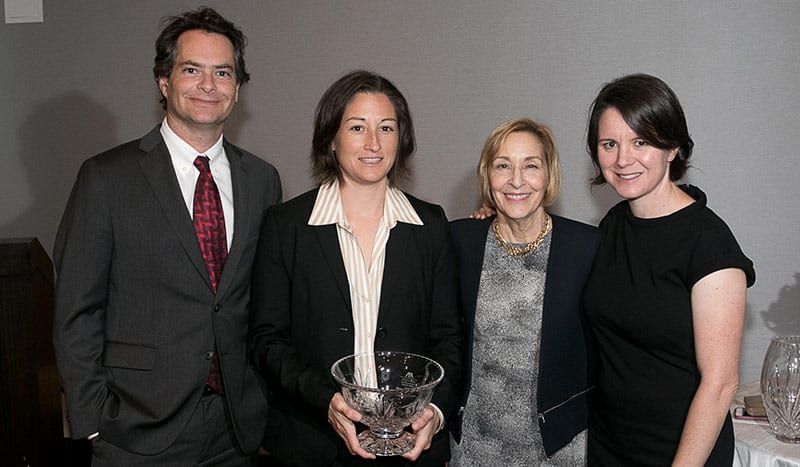
By Andrew Cohen
Their work is often frustrating, exhausting, and fraught with uphill battles—which made being honored for it that much sweeter for Megan McCracken and Jen Moreno ’06, attorneys with Berkeley Law’s Death Penalty Clinic.
At an American Bar Association event September 10 in Washington, D.C., the organization gave McCracken and Moreno its 2015 John Paul Stevens Guiding Hand of Counsel Award for their leadership, guidance, and expertise in lethal injection litigation across the United States. The annual award recognizes lawyers who demonstrate commitment and achievement on behalf of death-sentenced individuals, and who help develop innovative approaches to capital defense.
McCracken and Moreno lead the clinic’s Lethal Injection Project, which provides litigation resources and consultation to lawyers nationwide challenging the constitutionality of lethal injection. Since 2007, they have since served clients in 29 jurisdictions, achieved meaningful court victories, and provided legal assistance to numerous prisoners and legal teams.
“Megan and Jen are the nation’s leading experts on legal challenges to lethal injection methods,” said Natasha Minsker, director of the American Civil Liberties Union’s California Center for Advocacy & Policy. “They’re on call when an execution occurs almost anywhere in the country, responding to last-minute and post-execution requests for urgent help, no matter the hour.”
The Death Penalty Clinic first tackled lethal injection a decade ago, when Associate Director Ty Alper provided scholarship on the issue and summaries of ongoing litigation for capital defense lawyers.
“We could not have imagined the depth and breadth of the expertise Megan and Jen would develop, the unparalleled national resource they’d become as the Lethal Injection Project’s attorneys, or the longevity of this enterprise,” clinic Director Elisabeth Semel said. “Their tenacious work has exposed states’ willingness to obtain execution drugs secretly and illegally and to experiment with untested chemicals in executions.”
Leading the fight
McCracken and Moreno have been instrumental in challenging states’ execution practices under the Administrative Procedures Act, including in California, and the practice of importing lethal injection drugs from foreign countries in violation of the Food, Drug, and Cosmetic Act. They have also conducted training sessions for capital litigators and led the defender community in developing litigation strategies.
“As a direct result of their work, death row prisoners in multiple states have been spared from executions using untested drugs and experimental procedures,” said Dale Baich, supervisor of the Capital Habeas Unit at Arizona’s Federal Public Defender office. Baich called their efforts “instrumental in raising awareness of these issues among lawmakers and the public.”
While 35 of the 36 states with the death penalty use lethal injection as their main form of execution, the Supreme Court ruled in 2006 that its administration can be challenged through a federal civil rights lawsuit. Many death-row inmates have done just that, prompting several states to put lethal injection on hold amid claims that it violates the Eighth Amendment’s ban on cruel and unusual punishment.
“Over the last several years, prisoners have been executed with experimental procedures and illegal drugs and without knowing the relevant details of the procedures to be used,” Moreno said. “In 2014 alone, we saw three horribly botched executions. In all three, the departments of corrections used novel drug combinations and refused to disclose crucial information about how the men would be executed.”
While some recent court rulings have been disappointing for the duo, McCracken still sees the fruits of their labor—noting the “the extensive media coverage calling attention to the problems with lethal injection” and how public perception is “well-informed and ahead of the courts.”
After receiving the award, McCracken thanked the many law firms, nonprofits, and public defenders the clinic has worked with over the years, and those who have funded its efforts. She also credited Semel and Alper for creating an ideal working environment.
“Lis and Ty have gone above and beyond the call of duty to give us unflagging help and support,” McCracken said. “There are few things more comforting than knowing you have Lis Semel on speed dial when you don’t know what to do, and we’ve come to depend on Ty’s unique ability to find a calm, rational solution to a situation that has everyone else freaking out.”
Through setbacks and victories, Moreno vows to continue advocating against lethal injection.
“As long as states continue to carry out executions, we must continue to fight for our clients’ right to be executed in a constitutional manner,” she said. “We must also work to keep the states honest and continue to push them towards more accountability and transparency.”